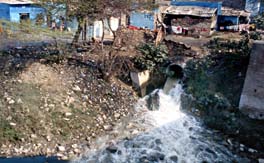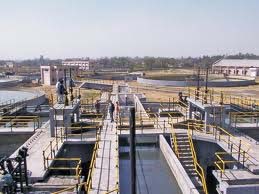/topics/wastewater
Wastewater
Where and how is the state - Accessing water and the state in Mumbai and Johannesburg - Journal of Asian and African Studies
Posted on 29 Oct, 2011 05:28 PMThis paper published in the Journal of Asian and African Studies examines the argument that the political and institutional contexts of service delivery shape people's access to the state and its resources and also the mediation between citizens and g
Performance of sewage treatment plants - Coliform reduction - Control of urban pollution series - CPCB (2008)
Posted on 27 Oct, 2011 12:38 PMThis report presents the findings of a study conducted by CPCB with the help of Indian Institute of Technology, Roorkee and Anna University, Chennai on the performa
Decentralised treatment and recycling of domestic wastewater - An integrated approach to water management - A pilot project - CPCB (2008)
Posted on 27 Oct, 2011 10:32 AMThis report by the Central Pollution and Control Board (CPCB) describes the various intervention measures chosen to reduce the ecological footprint of the Sangamam housing project at Auroville. These measures include water harvesting, recycling and waste management.
Evaluation of operation and maintenance of sewage treatment plants in India - Control of urban pollution series - CPCB (2007)
Posted on 26 Oct, 2011 03:39 PMThis study was commissioned recognizing the fact that discharge of untreated sewage occurs not only because of inadequate installed capacity of sewage plants, but also due to the inadequate maintenance of existing plants.
Water and wastewater analysis – A guide manual by Central Pollution Control Board
Posted on 03 Oct, 2011 10:14 PM This guide manual on water and wastewater analysis prepared by the Central Pollution Control Board (CPCB), caters to the need of evolving a simplified code of practice for the lab
This guide manual on water and wastewater analysis prepared by the Central Pollution Control Board (CPCB), caters to the need of evolving a simplified code of practice for the lab
Consortium for DEWATS Dissemination Society is looking for Documentation Specialist and Lab Technician, Bangalore
Posted on 03 Oct, 2011 09:28 PM
The Consortium for DEWATS Dissemination (CDD) Society is working to provide one million marginalised people with access to water, sanitation and energy by 2015. From their headquarters in Bangalore, they work through a network of like minded organisations across South Asia to provide cost effective, environmentally sound, and community specific basic needs services.
Revised guidelines for the centrally sponsored scheme of Common Effluent Treatment Plants (CETPs) - Ministry of Environment & Forests, 2011
Posted on 25 Sep, 2011 06:03 PM
Image courtesy: www.projectsmonitor.com
Under the Water (Prevention and Control of Pollution) Act, 1974, every industry has to provide adequate treatment of its effluents before disposal, irrespective of whether it is in stream, land, sewerage system of sea. The small scale industrial units (SSI), which are presently defined as units whose plant and machinery are valued at less than Rs. 5 crore occupy an important place in the country's economy. The SSIs are a major contributor to the total industrial pollution load of the country. However, only a small fraction of the effluent discharge from these units is estimated to be treated as on date.
Water for Indian cities - Government practices and policy concerns - Issue Brief - Observer Research Foundation
Posted on 24 Sep, 2011 04:50 PMThe urban expansion in India has not been met by a similar expansion in infrastructure and basic services. This has severely affected the quality of urban life and economic growth.
The war over blue gold
Posted on 19 Sep, 2011 04:45 PM"Per capita water availability to reduce by 2025", says Droplets: e-Newsletter from Everything About Water - August 2011
Posted on 17 Sep, 2011 06:18 PMArticle and Image Courtesy: Everything About Water
Highlights from the August edition of Droplets e-newsletter published by the Everything About Water
- India: Per capita water availability to reduce by 2025
- WHO: New guidelines for safer drinking water supply systems





